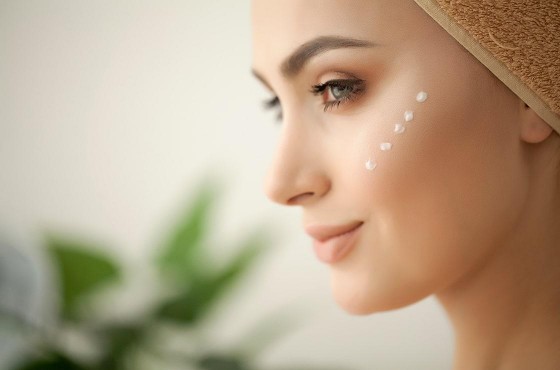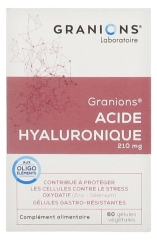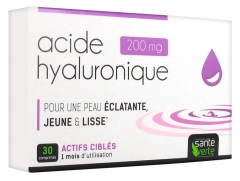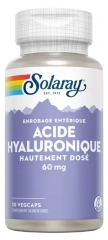Hyaluronic acid - for smoother, more hydrated skin
Written by Paul Musset, Doctor in Pharmacy | published on | updated on 02/04/2020

Hyaluronic acid is a molecule that is found naturally in the body. Nowadays, many cosmetic products and dietary supplements contain it due to its effective anti-wrinkle action. However, it boasts a whole host of other properties besides.
What is hyaluronic acid?
Hyaluronic acid is a natural polymer. The molecule is a polysaccharide made up of tens of thousands of smaller sugar molecules. It is found widely throughout the body, especially in the skin (and the other connective tissues), the neural tissues and the synovial fluid, which lubricates the joints.
It is estimated that an individual weighing 60 kilos will have a total of 12 grams of hyaluronic acid in their body, half of which is found in the skin. Between 5 and 30% of this store is regenerated each day.
How is hyaluronic acid obtained?
When this substance was first used, it was extracted from ground rooster combs. With advances in biotechnology it is now possible to obtain hyaluronic acid molecules that are identical to those produced by the body by harnessing genetically modified bacteria, through a process first introduced in Japan in 1988.
What is the function of hyaluronic acid in the human body?
Hyaluronic acid is important for the proper functioning of our joints. It modifies the texture of the synovial fluid, making it more viscous, while also softening the cartilage, which increases joint mobility. In the skin, it is principally found in the intercellular spaces. Thanks to its exceptional water-retaining properties (a thousand times its volume), it helps to maintain the skin’s suppleness and hydration. It also boosts cellular regeneration and wound healing. However, as we age, the levels synthesised by the body no longer compensate for its natural degeneration over time, which is partially responsible for the appearance of wrinkles, skin thinning and loss of elasticity, as well as certain types of joint pain. It is thought that the body’s hyaluronic acid reduces by a half by the time we reach the age of 50.
What causes the skin to age?
While the skin-ageing process is both inevitable and irreversible, it can still be slowed down by looking after your skin with a healthy lifestyle, a balanced diet and the appropriate choice of skincare products. The role played by sun exposure should not be underestimated. The face and the hands, which are far more exposed than the rest of the body, show the signs of ageing sooner. This illustrates the importance of being adequately protected from ultraviolet light.
Other factors include the slower regeneration of skin cells, a reduction in the skin’s hydrolipidic film as a result of the atrophy of the sweat and sebaceous glands and a reduction in the natural production of hyaluronic acid and collagen. Linked to elastin and other proteins, collagen plays a role in the cohesiveness of the body’s tissues (the skin, as well as tendons and ligaments), in terms of elasticity and hydration.
Hyaluronic acid injections
Injections of pure hyaluronic acid, administered using syringes fitted with ultra-fine needles, have been in use since around 2000 to address the development of wrinkles and the skin’s loss of firmness and hydration. The treatment may be on the surface of the skin or in the deeper layers, depending on individual needs (redefinition of the face or filling the nasolabial folds, frown lines or dark circles, etc. Hyaluronic acid can also be used to plump up the lips). We are now starting to see the product replacing collagen, as it is better tolerated and poses fewer allergy risks.
Three types of hyaluronic acid are used:
High molecular weight hyaluronic acid is identical to the natural substance and is used to fill wrinkles or as a deeper injection to redefine the contours of the face (cheekbones, temples, nose, chin, etc.). Its molecules are too large to penetrate below the stratum cornea when applied externally.
Low molecular weight hyaluronic acid is formed by chopping the higher weight substance into smaller fragments. It is primarily used in creams and serums owing to its ability to retain water, thus resulting in better skin hydration. To a certain degree, it is able to penetrate the skin more deeply due to its smaller molecules.
Third generation hyaluronic acid. This is produced using just one of the two sugars found in the natural form. This is the sugar used by the skin to kick start its own production of complete hyaluronic acid (for which the fibroblast cells are responsible).
Do hyaluronic acid and botulinum toxin (or Botox) have the same functions?
No. Botox works by relaxing the facial expression muscles which tend to shrink as we age and take the skin with them, such as frown lines between the eyebrows.
Hyaluronic acid products
Many high-quality products containing hyaluronic acid, including facial products or those for joint stability, are available from Cocooncenter. These include capsules that provide all the joint and skin benefits offered by this invaluable molecule, as well as firming serums and fluids for reducing wrinkles, lifting or moisturising creams, balms and suppositories promoting wound and burn healing, oral remedies to clear up mouth ulcers or heal injuries caused by dental treatment, etc. We stock a high-quality range of all types of hyaluronic acid, ensuring we can meet the needs of everyone.
You can’t go back in time and keep the skin you had in your twenties forever, but there are ways to slow down the ageing process, either mechanically by filling the furrows caused by the slackening of the skin, or by providing the skin with a substance it can no longer produce for itself.
Hyaluronic acid: the key takeaways:
- Appointments for hyaluronic acid injections last around 30 minutes. There are immediate visible effects, but these will continue to develop during the following week and will last for around a year, after which time it may be necessary to repeat the procedure. This should only be carried out in a healthcare setting.
- These injections are prohibited for pregnant or breastfeeding women, as well as for individuals suffering from certain chronic inflammatory diseases. The only side effects are potential temporary redness or uneven skin. Exposure to the sun, alcohol, smoking and taking aspirin or anti-inflammatories must be avoided in the days preceding and following the procedure.
- Whether in its pure form or combined with vitamin complexes or collagen, there are many types of hyaluronic acid which can be used by everyone, as a dietary supplement or a topical preparation. They offer a safe way to help maintain your joints, promote healing and keep your skin supple and well hydrated.


















